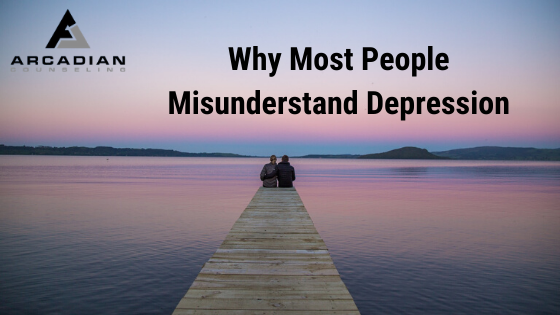Of all the words in the English language, depression may be one of the most misunderstood. Why does the word depression seem to confuse so many people? Why is its real meaning so hard to grasp for most people? And why do so few people take it serious?
Likely because the term has two starkly contrasting meanings, depending upon who is using it.
In therapy, depression is used to describe a debilitating syndrome that robs people of their energy, memories, ability to concentrate, love and experience joy and hope. It’s not just an emotional state but a physical one that impacts specific regions of the brain. Depression actually lights up the brain’s pain circuitry, including a state of suffering that can become debilitating.
Additionally, depression is actually neurotoxic, which means the disorder can eventually lead to the death of neurons in the critical memory and reasoning areas of the brain, including the hippocampus and prefrontal cortex.
Essentially, depression causes brain damage.
Depression & Colloquial Usage
Confusion abounds when the term “depression” is used by people in every day conversation. In these instances, they usually are referring to something far less serious or clinical. In fact, most people use the term is a synonym for sadness or simply being upset.
For instance, you may hear people make comments such as, “I was so depressed when Starbucks dropped its pumpkin spice latte,” or “Omg, Netflix just canceled my favorite show – I am so depressed right now.”
No, you’re bummed. Maybe really disappointed, but you are certainly not depressed. These kinds of disappointments, while frustrating, are simply a part of everyday life. Now if you find yourself unable to get out of bed for days on end and have pervasive thoughts of death and dying as a result of your beloved latte getting cancelled; well, that’s a different story.
Canceled shows and discontinued lattes have little effect on our ability to function, and the feelings of disappointment and annoyance rarely last for very long.
In contrast, clinical depression often persists for months, and no amount of family support from loved ones is enough to make it any less debilitating. People who suffer from clinical depression experience a depressed mood most of the day, every day. They typically experience fatigue, loneliness, weight loss, decreased interest in activities, recurrent thoughts of death and suicide, and an inability to concentrate.
Does this sound like a typical reaction to your favorite show getting cancelled or your latte getting discontinued?
Time for New Language
And that is where the confusion lies, and why so many people simply don’t understand the true ramifications of clinical depression. It is also why those who suffer from depression are met with relative (and often significant) indifference when they open up to friends or family about their condition. In fact, that indifference or invalidation of their experience by loved one’s often only serves to perpetuate the negative emotions and symptoms they are already experience. It’s like kicking someone when they’re down. Yet, as a society and culture, we do it all the time.
“Really? You don’t even look depressed.”
“Oh, stop being such a baby and come on out with us.”
“Just snap out of it already.”
If you’ve ever struggled with depression, these probably sound familiar.
The sad reality is that, because of this profound confusion, many depressed people are expected to simply “snap out of it” by their friends and family. No one would ever take this attitude with someone suffering from cancer or kidney disease. Would you tell someone with Parkinson’s Disease, it’s all in their head?
However, the admonition is equally offensive and inappropriate in the case of clinical depression.
Perhaps it’s time to come up with a new term to describe the symptoms of clinical depression. There’s no question it can be hard to be supportive to someone struggling with depression if you’ve never experienced it yourself. But simply acknowledging the person’s feelings can do wonders. “I see you’re really struggling right now and I’m sorry I don’t know what to say” goes a long way.
By using new language, more people might understand depression and show more compassion toward individuals suffering from it.
James Killian, LPC is the Principal Therapist & Owner of Arcadian Counseling in New Haven, CT where they specialize in helping over-thinkers, high achievers, and perfectionists take control and move From Surviving to Thriving.



